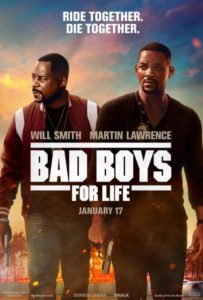 Michael Bay took a backseat approach to the newest installment of the Bad Boys franchise—a franchise that was significant for how it brought black actors to the forefront in the beginning—as a producer and brought in Belgian directors, Adil & Bilall. For anyone who was a fan of the first two films in the 90s and 2000s, the expectation of a third film 17 years after the last installment did not necessarily bode well. Not only are Will Smith and Martin Lawrence older, but the world has moved on from some of the machismo and gloss that made the original films so popular in their day.
Michael Bay took a backseat approach to the newest installment of the Bad Boys franchise—a franchise that was significant for how it brought black actors to the forefront in the beginning—as a producer and brought in Belgian directors, Adil & Bilall. For anyone who was a fan of the first two films in the 90s and 2000s, the expectation of a third film 17 years after the last installment did not necessarily bode well. Not only are Will Smith and Martin Lawrence older, but the world has moved on from some of the machismo and gloss that made the original films so popular in their day.
This isn’t to say that it was impossible, because even Lethal Weapon 4 was able to create an effective and equally humorous installment once Mel Gibson and Danny Glover started to clearly show their age. However, the youthful swagger has to give way to a hard-fought wisdom and cynicism that pervades these action hero characters later in life. Considering Bay’s recent output, it was probably a good move to give the property over to new blood. Bay hasn’t shown himself to mature in his thematic and technical output so giving it over to some directors who could inject a coherent storyline and some realistic emotion was perhaps the smartest move that Bay has made in the last decade or two.
Perhaps the most fascinating edition to the franchise is a stark focus on the religious life of Marcus Burnett (Lawrence) which ends up playing a significant role in the narrative of the film and becomes the central conflict between him and Mike Lowery (Smith). When Mike is shot and is touch and go in the hospital, Mike turns to God and makes a relatively frequent cinematic promise to God: save my friend and I’ll not bring any more violence into this world. This element by itself is not new but seeing how long the writers hold off from the inevitable breaking of that sacred covenant creates not only some really quality comedy in the face of danger but gives the film a theological depth rarely found in such flashy, neon action films. Marcus finds himself trying to get Mike to give up on his hunt for vengeance, because violence begets more violence. Now, by the end of the film, Marcus does take up a gun, but he ends up being brutalized more than being the perpetrator of violence. It’s not as clear cut the more one ponders the narrative beats of the film.
 However, it is the final reveal that connects Mike with the “bad guy” that showcases the consequences of the violent work they do: the loves that are shattered, the bonds that are snapped, and the revelations that open our eyes to who exactly our enemy is. The film shows that the line between good and bad is often so thin and transparent as to be indistinguishable. The fact that these ideas are pressed into the story while maintaining the kinetic and humorous elements that have always made the films so likable places the film in a space where they are explicitly more Christian in their ideas than the moral therapeutic deism of “Christian films” made by the likes of the Kendrick brothers. I’d much rather entertain the recommendation of Bad Boys For Life to fellow Christians than those films that haunt the cork boards of church halls across America.
However, it is the final reveal that connects Mike with the “bad guy” that showcases the consequences of the violent work they do: the loves that are shattered, the bonds that are snapped, and the revelations that open our eyes to who exactly our enemy is. The film shows that the line between good and bad is often so thin and transparent as to be indistinguishable. The fact that these ideas are pressed into the story while maintaining the kinetic and humorous elements that have always made the films so likable places the film in a space where they are explicitly more Christian in their ideas than the moral therapeutic deism of “Christian films” made by the likes of the Kendrick brothers. I’d much rather entertain the recommendation of Bad Boys For Life to fellow Christians than those films that haunt the cork boards of church halls across America.
Review| Bad Boys For Life
